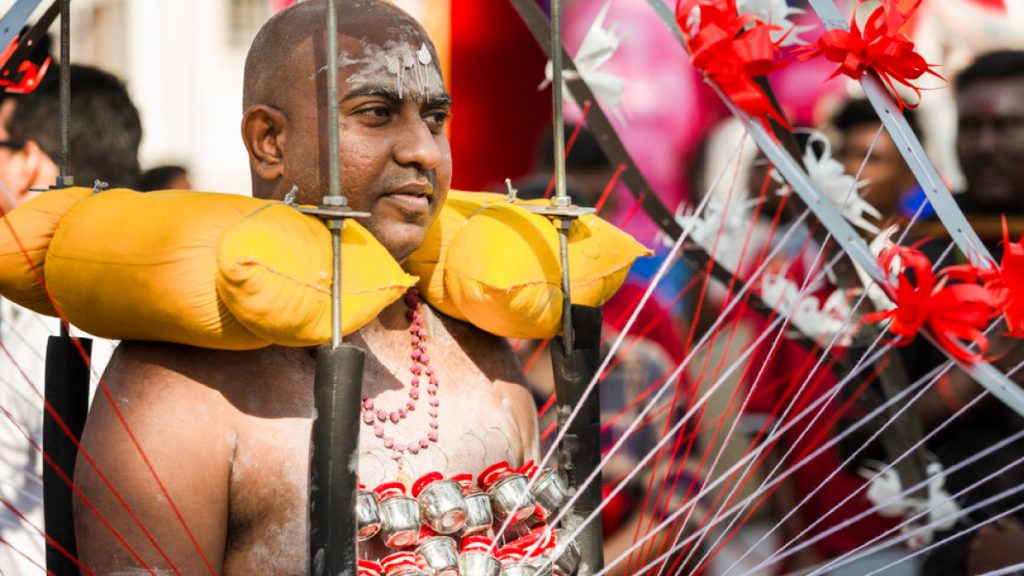Thaipusam is a significant Hindu festival observed primarily by the Tamil community in Malaysia. Celebrated on the full moon day of the Tamil month of Thai, typically in January or February, Thaipusam honours Lord Murugan, the god of war. The festival is known for its elaborate rituals, including kavadi (burden-bearing) processions, acts of penance, and prayers.
Thaipusam Dates (2024-2027)
| Year | Date | Day | States Observed |
|---|---|---|---|
| 2024 | 25 January | Thursday | Nationwide |
| 2025 | 12 February | Wednesday | Nationwide |
| 2026 | 2 February | Monday | Nationwide |
| 2027 | 21 January | Thursday | Nationwide |
History and Background
Thaipusam commemorates the occasion when Parvati, the consort of Lord Shiva, gave Murugan a vel (spear) to vanquish the demon Soorapadman. The festival symbolizes the victory of good over evil and the power of faith and devotion. Thaipusam is celebrated with great fervour in Malaysia, particularly in the states of Selangor, Penang, and Perak, where large Hindu communities reside.
Malaysian Traditions and Cultural Significance
Kavadi Attam (Burden Dance)
The central ritual of Thaipusam is the kavadi attam, where devotees carry decorated structures called kavadis as a form of penance and devotion. The kavadis, often adorned with peacock feathers, flowers, and pictures of deities, can be simple wooden frames or elaborate structures attached to the body with hooks and skewers.
Piercing and Penance
Devotees undertake acts of penance and self-mortification during Thaipusam. This includes piercing their skin, tongue, and cheeks with skewers and hooks as an offering to Lord Murugan. These acts of devotion are performed with the belief that they bring spiritual merit and fulfill vows made to the deity.
Processions
Grand processions are a hallmark of Thaipusam celebrations in Malaysia. Devotees walk barefoot from one temple to another, often covering long distances. The most famous procession is from the Sri Mahamariamman Temple in Kuala Lumpur to the Batu Caves, where a large statue of Lord Murugan stands at the entrance of the cave temple complex.
Prayers and Offerings
Prayers and offerings are central to Thaipusam. Devotees offer fruits, flowers, and milk to Lord Murugan. Special prayers and pujas (rituals) are conducted in temples, and the atmosphere is charged with the chanting of hymns and devotional songs.
Community and Charity
Thaipusam is also a time for community bonding and charity. Many volunteers set up stalls along procession routes, offering free food and drinks to devotees and participants. These acts of charity and community service reflect the festival’s spirit of compassion and solidarity.
Thaipusam Celebrations Across Malaysia
Batu Caves, Selangor
Batu Caves is the most iconic venue for Thaipusam celebrations in Malaysia. The cave temple complex, with its 272 steps leading to the main temple, attracts millions of devotees and tourists. The atmosphere is electric, with kavadis, music, and a sea of pilgrims creating a vibrant and spiritual experience.
George Town, Penang
In Penang, the Thaipusam celebrations are centred around the Arulmigu Balathandayuthapani Temple. Devotees carry kavadis and milk pots in a grand procession from the Penang Waterfall Hilltop Temple to the temple on the hill. The festivities in Penang are known for their elaborate kavadis and enthusiastic participation.
Ipoh, Perak
Ipoh’s Kallumalai Arulmigu Subramaniyar Temple is a focal point for Thaipusam in Perak. The celebrations include processions, kavadi dances, and piercing rituals. The temple, located near a limestone hill, provides a picturesque backdrop for the spiritual activities.
Other Locations
Thaipusam is also celebrated in other parts of Malaysia, including Johor Bahru, Melaka, and Kuantan. Each location adds its unique flavour to the festivities, reflecting the diversity and unity of Malaysia’s Hindu community.
Conclusion: A Festival of Faith and Devotion
Thaipusam in Malaysia is a profound display of faith, devotion, and community spirit. Through rituals such as kavadi attam, piercing, processions, and prayers, devotees express their deep devotion to Lord Murugan. The festival’s vibrant celebrations, marked by acts of penance, charity, and cultural performances, highlight the rich cultural tapestry of Malaysia and the enduring power of religious traditions.
Frequently Asked Questions (FAQs)
Is Thaipusam a public holiday in Malaysia?
Thaipusam is a public holiday in certain states, including Selangor, Penang, Perak, Johor, Negeri Sembilan, and Kuala Lumpur. In other states, it is widely observed but not an official public holiday.
How do Malaysians typically celebrate Thaipusam?
Malaysians celebrate Thaipusam with kavadi processions, acts of penance such as piercing, prayers, offerings, and community service. Major temples like Batu Caves and the Penang Hilltop Temple are key locations for the celebrations.
What is the significance of carrying kavadis during Thaipusam?
Carrying kavadis is an act of devotion and penance. Devotees carry the burden to fulfill vows made to Lord Murugan, seeking his blessings and expressing their faith and gratitude.
What are some popular destinations in Malaysia to experience Thaipusam?
Popular destinations include Batu Caves in Selangor, the Arulmigu Balathandayuthapani Temple in Penang, and the Kallumalai Arulmigu Subramaniyar Temple in Ipoh, Perak, where large-scale celebrations and processions take place.

